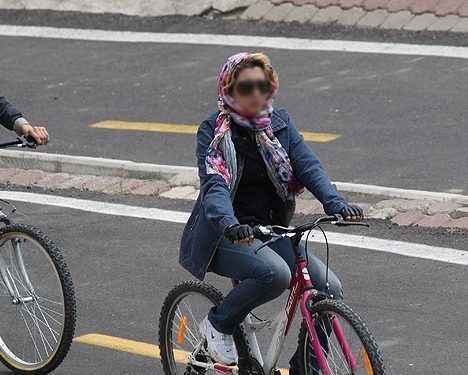The Tehran Transit Authority has imported 5,000 bicycles from China as part of a plan to reduce air pollution in the city. Police will use some of the bicycles, and the rest will be available to the general public as part of a public bike-hire scheme.
“There is no ban on girls and women using the bicycles as long as they observe Islamic values,” a statement by the transit authority said.
An exhibition of smart bicycles — a startup application based on the Internet of Things — opened on August 28 in Tehran to promote a joint venture between the city’s Traffic and Transportation Organization and Bidood (meaning ‘Smoke-Free’), a startup bicycle company, to introduce a public cycle hire scheme in Iran. Although the bicycle is one of 75 items not allowed into the country, Bidood has imported 5,000 smart bikes from China.
Meanwhile, the Tehran City Council and the Law Enforcement Forces of the Islamic Republic (NAJA) recently rolled out the police bicycle scheme. The Tehran chief of police Hossein Rahimi said: “Our main concern is cyclists disregarding traffic regulations, particularly when making left turns. Many cyclists don’t follow the most basic safety rules. We must reeducate them. Also, the bicycle police have limited duties.”
Mohsen Pour Seyyed Aghaei, the managing director of Tehran’s Traffic and Transportation Organization, said the city must address the rights of girls and women to use public bicycles for hire. “People would be able to use their smartphones to rent a bicycle. We would start with standard bicycles and gradually introduce those with gears and eventually move to electric ones,” Mr. Aghaei said.
[aesop_video align=”center” src=”self” hosted=”https://kayhanlife.com/wp-content/uploads/2018/09/docharkhe.mp4″ disable_for_mobile=”off” loop=”on” autoplay=”on” controls=”on” viewstart=”on” viewend=”on” revealfx=”off” overlay_revealfx=”off”]
“We’ll roll out the public cycle hire scheme in four central districts of Tehran, because people can get to those areas with public transport and then use the bicycles to get around the city,” Aghaei explained. “Anyone can hire these bicycles. It would be the responsibility of girls and women to observe the hijab law. It is not our job to enforce the dress code. We ask the female population to adhere to Islamic values to avoid any social disorder which may prompt other agencies to get involved and impose restrictions on girls and women cyclists.”
Translated from Persian by Fardine Hamidi






